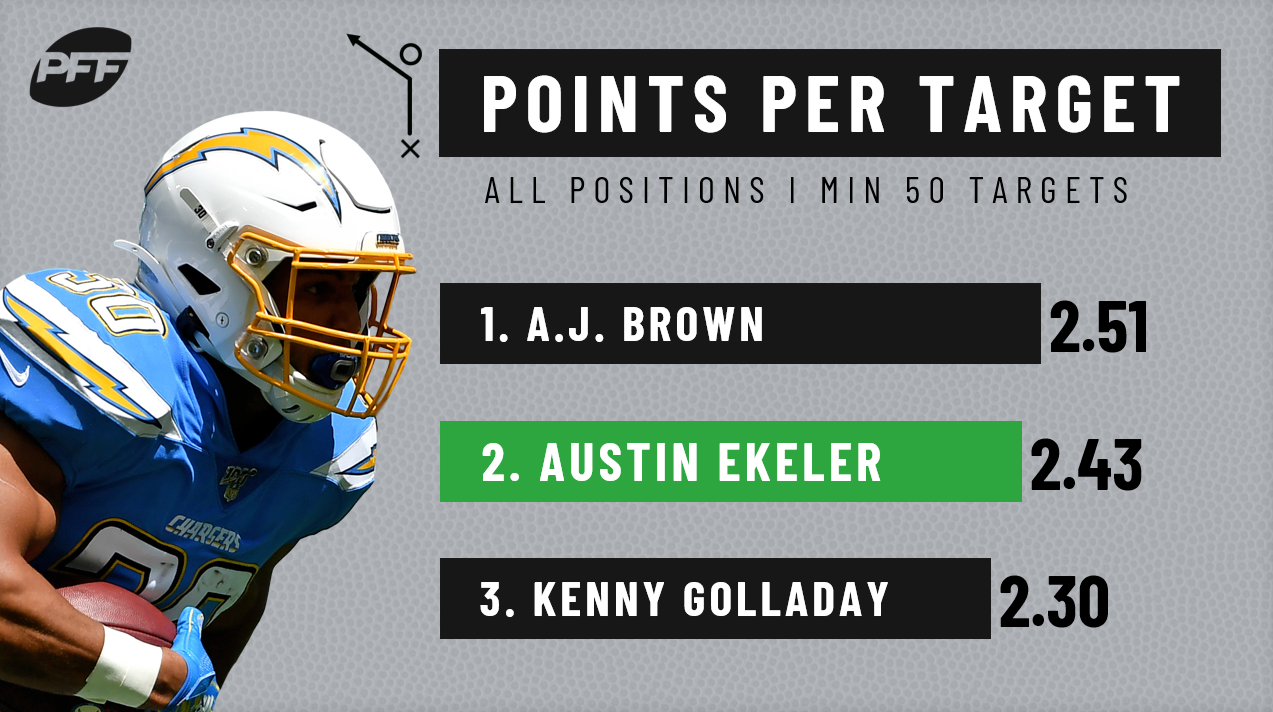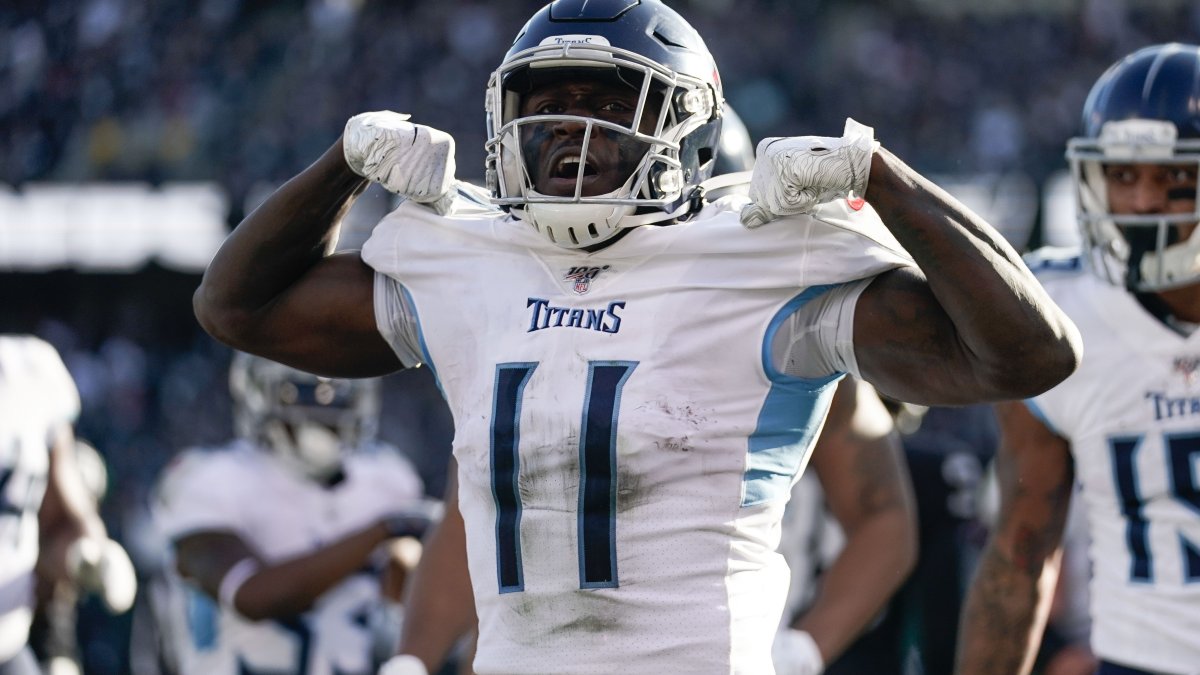Each week in this space, we’ll be taking a look back at Sunday’s games to find five of the most interesting or most important stats for fantasy football owners. With 15 of 16 games from NFL Week 14 in the books, here are the five stats you need to know:
1. Since his first start in Week 7, Ryan Tannehill ranks behind only Lamar Jackson in fantasy points per game (22.6). Across the full season, Tannehill ranks second in fantasy points per dropback (0.64), first in passer rating (109.4), first in yards per attempt (9.42), and first in adjusted yards per attempt (9.35).
And these numbers aren’t just great, they’re historically great – 0.64 fantasy points per dropback ranks top-10 this past decade, 9.42 yards per attempt ranks top-10 all-time, and 9.35 adjusted yards per attempt ranks top-20 all-time.
Considering Tannehill’s prior career average was just 7.0 yards per attempt, it’s hard to make sense of this impressive turnaround. What’s changed? Could it be as simple as no longer having Adam Gase calling his plays? Or, could it be Tennessee’s offensive line, which has kept Tannehill clean on 72% of his dropbacks (tied for second-most)? Tannehill’s prior-career-average was just 64%, and, once upon a time, Tannehill was the league’s most pressure-sensitive quarterback.
Really, I’m not sure what’s behind Tannehill’s resurgence, but I do know he needs to be started as a mid- to low-end QB1 until further notice. His next two games both come at home against Houston (Week 15) and New Orleans (Week 16). Houston ranks fourth (25.5) and New Orleans ranks ninth (23.6) in fantasy points per game allowed to opposing quarterbacks.
2. On Sunday, A.J. Brown caught five of seven targets for 153 yards and two touchdowns. Among all 71 wide receivers to see 50 or more targets, Brown ranks third in yards per route run (2.57), second in passer rating when targeted (124.5), and first in all of the following: yards per target (12.8), fantasy points per target (2.47), missed tackles forced per reception (0.38), yards after contact per reception (5.55), and yards after the catch per reception (10.1).
In other words, Brown ranks top-three in every efficiency metric I find meaningful for a fantasy wide receiver. Though impressive, this is not shocking — Brown was my favorite wide receiver prospect of the 2019 class, posting historically great numbers in some of our metrics, including depth-adjusted yards per target.
If you own Brown in dynasty, congratulations. He already looks every bit the part of a true NFL WR1 and a potential future superstar.
If you own him in season-long, his prospects are slightly less rosy, but he could still be a viable contributor for you in the fantasy playoffs. As outlined above, Tannehill is on fire, and Brown clearly appears to be his favorite and most productive target. Furthermore, rookie wide receivers do tend to breakout in the second half of the season.

3. In a game the Saints scored 46 points, Alvin Kamara scored just 6.3 fantasy points. Across the full season, he's averaging a career-low 16.9 fantasy points per game, ninth among running backs. Across his first two seasons, Kamara averaged 21.8 fantasy points per game, which ranked behind only Todd Gurley.
It’s hard to say exactly what’s wrong with Kamara.
Latavius Murray isn’t to blame. In games active, Kamara is playing on 72% of the team’s snaps while averaging 13.0 carries and 7.6 targets per game. For perspective, across his first two seasons, Kamara played on just 51% of the team’s snaps while averaging 10.1 carries and 6.6 targets per game.
Perhaps it’s just a natural and what-should-have-been expected regression to the mean. Throughout NFL history, there are over 900 instances of a running back totaling at least 100 carries in a single season. Within that sample, Kamara’s 2017 season ranks best (1.59) and his 2018 season ranks fifth-best (1.29) in fantasy points per touch. That’s insanely impressive but also glaringly unsustainable – unless we think Kamara is easily the greatest running back of all time, he’s probably a massive longshot to come close to posting his third-consecutive top-0.1% season in a row. This year he averages 0.90 fantasy points per touch, which is a solid number (12th-best of 38 qualifiers) but not one of the best numbers ever.
4. On Sunday, Austin Ekeler totaled 101 rushing yards on just eight carries. Through the air, he totaled 112 receiving yards on just four catches (five targets). This was the first time in NFL history a player posted a 100/100 game on fewer than 15 touches.
This was an impressive feat, but not as impressive as this:
Ekeler now leads all running backs in fantasy points per touch (1.44). Remember our stat from our last section? This ranks second-best by any running back in any season all-time (of 900-plus qualifiers), behind only Kamara’s 2017 season (1.59) and just ahead of Marshall Faulk’s 2000 season (1.36).
Ekeler is also averaging 0.54 fantasy points per snap, which leads all running backs and ranks top-10 this past decade. In 2018, Ekeler ranked fourth in both fantasy points per touch (1.18) and fantasy points per snap (0.49).

Among all 107 receivers with at least 50 targets this year, Ekeler ranks second in receiving points per target (2.46), behind only A.J. Brown. That’s quite easily the most by any running back in any season in NFL history.
Among all running backs, Ekeler ranks third in PFF grade, after ranking sixth-best in 2018. Melvin Gordon ranks 32nd, after ranking eighth in 2018.
I’m not here to argue that Los Angeles should be starting Ekeler over Gordon, though I do think that’s the case. I’m here to remind you Gordon probably won’t be playing for Los Angeles next year. And, before Gordon returned in Week 5, Ekeler averaged 26.8 fantasy points per game, which would rank tied with Lamar Jackson for second-most among all players.
By dynasty ADP, he ranks just 26th among running backs. Ekeler’s talent, efficiency, and upside are all well established. He’s only 24 years old. And, the incumbent starter is due to hit free agency. In other words, his dynasty ADP is very dumb.
5. Among all quarterbacks, Jameis Winston ranks top-three in passing yards (4,185), passing touchdowns (26), interceptions (25), sacks (43), and fumbles (12).
Winston ranks eighth in fantasy points per game (19.0).
Excluding turnovers, Winston leads all quarterbacks in passing fantasy points, averaging 20.7 passing fantasy points per game. However, including turnovers, that number shrinks by a league-high 3.9 fantasy points per game.
By DraftKings scoring (where there’s a 300-yard bonus and interceptions are only worth negative-1), Winston ranks fourth in fantasy points, averaging 23.2 per game.
If you’re a Winston owner, you just need to accept the good with the bad and be thankful turnovers and sacks aren’t as damaging as they are in fantasy football as they are in real-football.
However, that might not matter much anymore. Winston has arguably the best postseason schedule of any quarterback, facing Detroit, Houston, and Atlanta over his next three games. All three defenses rank bottom-seven in opposing passer rating, fantasy points allowed per game, and fantasy points allowed per dropback. Perhaps most importantly, Detroit (Week 15) and Houston (Week 16) both rank bottom-four in interception percentage.



 © 2026 PFF - all rights reserved.
© 2026 PFF - all rights reserved.